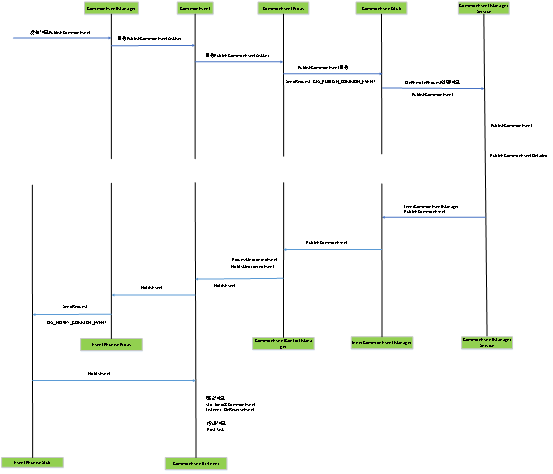您现在的位置是:首页 >技术教程 >消息通知之系统层事件发布相关流程网站首页技术教程
消息通知之系统层事件发布相关流程
简介消息通知之系统层事件发布相关流程
前言
Openharmony 3.1Release中存在消息通知的处理,消息通知包括系统层事件发布、消息订阅、消息投递与处理,为了开发者能够熟悉消息的处理流程,本篇文章主要介绍系统层事件发布的相关流程。
整体流程

代码流程
发布消息
{
eventAction)want.SetAction("usual.event.license.LIC_EXPIRED");
EventFwk::CommonEventPublishInfo publishInfo;
CommonEventData commonData;
commonData.SetWant(want);
if (!CommonEventManager::PublishCommonEvent(commonData, publishInfo)) {
LICENSE_LOGI("failed to publish event[%{public}d]", eventAction);
return false;
}
return true;
}
CommonEventManager函数处理,调用PublishCommonEvent
{
CommonEventPublishInfo publishInfo;
return PublishCommonEventAsUser(data, publishInfo, nullptr, UNDEFINED_USER);
}
调用PublishCommonEventAsUser
const CommonEventPublishInfo &publishInfo, const std::shared_ptr<CommonEventSubscriber> &subscriber,
const int32_t &userId)
{
EVENT_LOGI("enter");
return DelayedSingleton<CommonEvent>::GetInstance()->PublishCommonEventAsUser(data, publishInfo, subscriber,
userId);
}
调用CommonEvent的PublishCommonEventAsUser
const std::shared_ptr<CommonEventSubscriber> &subscriber, const int32_t &userId)
{
EVENT_LOGI("enter");
sptr<IRemoteObject> commonEventListener = nullptr;
if (!PublishParameterCheck(data, publishInfo, subscriber, commonEventListener)) {
return false;
}
EVENT_LOGD("before PublishCommonEvent proxy valid state is %{public}d", isProxyValid_);
return commonEventProxy_->PublishCommonEvent(data, publishInfo, commonEventListener, userId);
}
CommonEventProxy调用PublishCommonEvent向服务端发送CES_PUBLISH_COMMON_EVENT消息
const sptr<IRemoteObject> &commonEventListener, const int32_t &userId)
{
EVENT_LOGD("start");
MessageParcel data;
MessageParcel reply;
…….
bool ret = SendRequest(ICommonEvent::Message::CES_PUBLISH_COMMON_EVENT, data, reply);
if (ret) {
ret = reply.ReadBool();
}
EVENT_LOGD("end");
return ret;
}
服务端接收CES_PUBLISH_COMMON_EVENT消息
{
if (data.ReadInterfaceToken() != GetDescriptor()) {
EVENT_LOGE("local descriptor is not equal to remote");
return ERR_TRANSACTION_FAILED;
}
switch (code) {
case static_cast<uint32_t>(ICommonEvent::Message::CES_PUBLISH_COMMON_EVENT): {
std::unique_ptr<CommonEventData> event(data.ReadParcelable<CommonEventData>());
std::unique_ptr<CommonEventPublishInfo> publishinfo(data.ReadParcelable<CommonEventPublishInfo>());
sptr<IRemoteObject> commonEventListener = nullptr;
bool hasLastSubscriber = data.ReadBool();
if (hasLastSubscriber) {
sptr<IRemoteObject> commonEventListener = data.ReadRemoteObject();
}
int32_t userId = data.ReadInt32();
if (!event) {
EVENT_LOGE("Failed to ReadParcelable<CommonEventData>");
return ERR_INVALID_VALUE;
}
if (!publishinfo) {
EVENT_LOGE("Failed to ReadParcelable<CommonEventPublishInfo>");
return ERR_INVALID_VALUE;
}
bool ret = PublishCommonEvent(*event, *publishinfo, commonEventListener, userId);
if (!reply.WriteBool(ret)) {
EVENT_LOGE("Failed to write reply ");
return ERR_INVALID_VALUE;
}
break;
}
……..
default:
EVENT_LOGW("unknown, code = %{public}u, flags= %{public}u", code, option.GetFlags());
return IPCObjectStub::OnRemoteRequest(code, data, reply, option);
}
return NO_ERROR;
}
调用服务端PublishCommonEvent函数
const CommonEventPublishInfo &publishinfo, const sptr<IRemoteObject> &commonEventListener, const int32_t &userId)
{
EVENT_LOGI("enter");
if (!IsReady()) {
return false;
}
return PublishCommonEventDetailed(event, publishinfo, commonEventListener, IPCSkeleton::GetCallingPid(),
IPCSkeleton::GetCallingUid(),userId);
}
PublishCommonEventDetailed绑定PublishCommonEvent,然后进行事件投递
const CommonEventPublishInfo &publishinfo, const sptr<IRemoteObject> &commonEventListener, const pid_t &pid,
const uid_t &uid, const int32_t &userId)
{
EVENT_LOGI("enter");
struct tm recordTime = {0};
if (!GetSystemCurrentTime(&recordTime)) {
EVENT_LOGE("Failed to GetSystemCurrentTime");
return false;
}
std::string bundleName = DelayedSingleton<BundleManagerHelper>::GetInstance()->GetBundleName(uid);
if (DelayedSingleton<PublishManager>::GetInstance()->CheckIsFloodAttack(uid)) {
EVENT_LOGE("Too many common events have been sent in a short period from %{public}s (pid = %{public}d, uid = "
"%{public}d, userId = %{public}d)", bundleName.c_str(), pid, uid, userId);
return false;
}
Security::AccessToken::AccessTokenID callerToken = IPCSkeleton::GetCallingTokenID();
std::function<void()> PublishCommonEventFunc = std::bind(&InnerCommonEventManager::PublishCommonEvent,
innerCommonEventManager_, event, publishinfo, commonEventListener, recordTime, pid,
uid, callerToken, userId, bundleName, this);
return handler_->PostTask(PublishCommonEventFunc);
}
在事件投递中调用处理InnerCommonEventManager::PublishCommonEvent
const sptr<IRemoteObject> &commonEventListener, const struct tm &recordTime, const pid_t &pid, const uid_t &uid,
const Security::AccessToken::AccessTokenID &callerToken, const int32_t &userId, const std::string &bundleName,
const sptr<IRemoteObject> &service)
{
EVENT_LOGI("enter %{public}s(pid = %{public}d, uid = %{public}d), event = %{public}s to userId = %{public}d",
bundleName.c_str(), pid, uid, data.GetWant().GetAction().c_str(), userId);
if (data.GetWant().GetAction().empty()) {
EVENT_LOGE("the commonEventdata action is null");
return false;
}
if ((!publishInfo.IsOrdered()) && (commonEventListener != nullptr)) {
EVENT_LOGE("When publishing unordered events, the subscriber object is not required.");
return false;
}
std::string action = data.GetWant().GetAction();
bool isSystemEvent = DelayedSingleton<CommonEventSupport>::GetInstance()->IsSystemEvent(action);
…….
if (!controlPtr_) {
EVENT_LOGE("CommonEventControlManager ptr is nullptr");
return false;
}
controlPtr_->PublishCommonEvent(eventRecord, commonEventListener);
…….
return true;
}
默认IsOrdered是false,参数不配置调用ProcessUnorderedEvent
const CommonEventRecord &eventRecord, const sptr<IRemoteObject> &commonEventListener)
{
EVENT_LOGI("enter");
bool ret = false;
if (!eventRecord.publishInfo->IsOrdered()) {
ret = ProcessUnorderedEvent(eventRecord);
} else {
ret = ProcessOrderedEvent(eventRecord, commonEventListener);
}
return ret;
}
无序事件处理,投递事件在hander中调用NotifyUnorderedEvent
const CommonEventRecord &eventRecord, const std::shared_ptr<EventSubscriberRecord> &subscriberRecord)
{
…….
std::function<void()> innerCallback =
std::bind(&CommonEventControlManager::NotifyUnorderedEvent, this, eventRecordPtr);
if (eventRecord.isSystemEvent) {
ret = handler_->PostImmediateTask(innerCallback);
} else {
ret = handler_->PostTask(innerCallback);
}
return ret;
}
NotifyUnorderedEvent调用NotifyEvent
{
……
for (auto vec : eventRecord->receivers) {
size_t index = eventRecord->nextReceiver++;
eventRecord->curReceiver = vec->commonEventListener;
if (vec->isFreeze) {
eventRecord->deliveryState[index] = OrderedEventRecord::SKIPPED;
DelayedSingleton<CommonEventSubscriberManager>::GetInstance()->InsertFrozenEvents(vec, *eventRecord);
} else {
……
if (ret == OrderedEventRecord::DELIVERED) {
eventRecord->state = OrderedEventRecord::RECEIVEING;
commonEventListenerProxy->NotifyEvent(
*(eventRecord->commonEventData), false, eventRecord->publishInfo->IsSticky());
eventRecord->state = OrderedEventRecord::RECEIVED;
}
}
}
……
}
在EventReceiveProxy::NotifyEvent函数中发送消息CES_NOTIFY_COMMON_EVENT
{
……
int32_t result = remote->SendRequest(
static_cast<uint32_t>(IEventReceive::Message::CES_NOTIFY_COMMON_EVENT), data, reply, option);
if (result != OHOS::NO_ERROR) {
EVENT_LOGE("Failed to SendRequest, error code: %{public}d", result);
return;
}
EVENT_LOGD("end");
}
服务端接收消息调用服务端NotifyEvent函数
{
if (data.ReadInterfaceToken() != GetDescriptor()) {
EVENT_LOGE("local descriptor is not equal to remote");
return ERR_TRANSACTION_FAILED;
}
switch (code) {
case static_cast<uint32_t>(IEventReceive::Message::CES_NOTIFY_COMMON_EVENT): {
std::unique_ptr<CommonEventData> eventData(data.ReadParcelable<CommonEventData>());
bool ordered = data.ReadBool();
bool sticky = data.ReadBool();
if (eventData == nullptr) {
EVENT_LOGE("callback stub receive common event data is nullptr");
return ERR_INVALID_VALUE;
}
NotifyEvent(*eventData, ordered, sticky);
break;
}
default:
EVENT_LOGW("event receive stub receives unknown code, code = %{public}u", code);
return IPCObjectStub::OnRemoteRequest(code, data, reply, option);
}
return NO_ERROR;
}
服务端NotifyEvent函数,调用OnReceiveEvent
{
EVENT_LOGI("enter");
std::lock_guard<std::mutex> lock(mutex_);
if (!IsReady()) {
EVENT_LOGE("not ready");
return;
}
std::function<void()> onReceiveEventFunc =
std::bind(&CommonEventListener::OnReceiveEvent, this, commonEventData, ordered, sticky);
handler_->PostTask(onReceiveEventFunc);
}
从上面我们就梳理整个系统层事件发布流程,希望对大家有所帮助。
风语者!平时喜欢研究各种技术,目前在从事后端开发工作,热爱生活、热爱工作。






 U8W/U8W-Mini使用与常见问题解决
U8W/U8W-Mini使用与常见问题解决 QT多线程的5种用法,通过使用线程解决UI主界面的耗时操作代码,防止界面卡死。...
QT多线程的5种用法,通过使用线程解决UI主界面的耗时操作代码,防止界面卡死。... stm32使用HAL库配置串口中断收发数据(保姆级教程)
stm32使用HAL库配置串口中断收发数据(保姆级教程) 分享几个国内免费的ChatGPT镜像网址(亲测有效)
分享几个国内免费的ChatGPT镜像网址(亲测有效) Allegro16.6差分等长设置及走线总结
Allegro16.6差分等长设置及走线总结